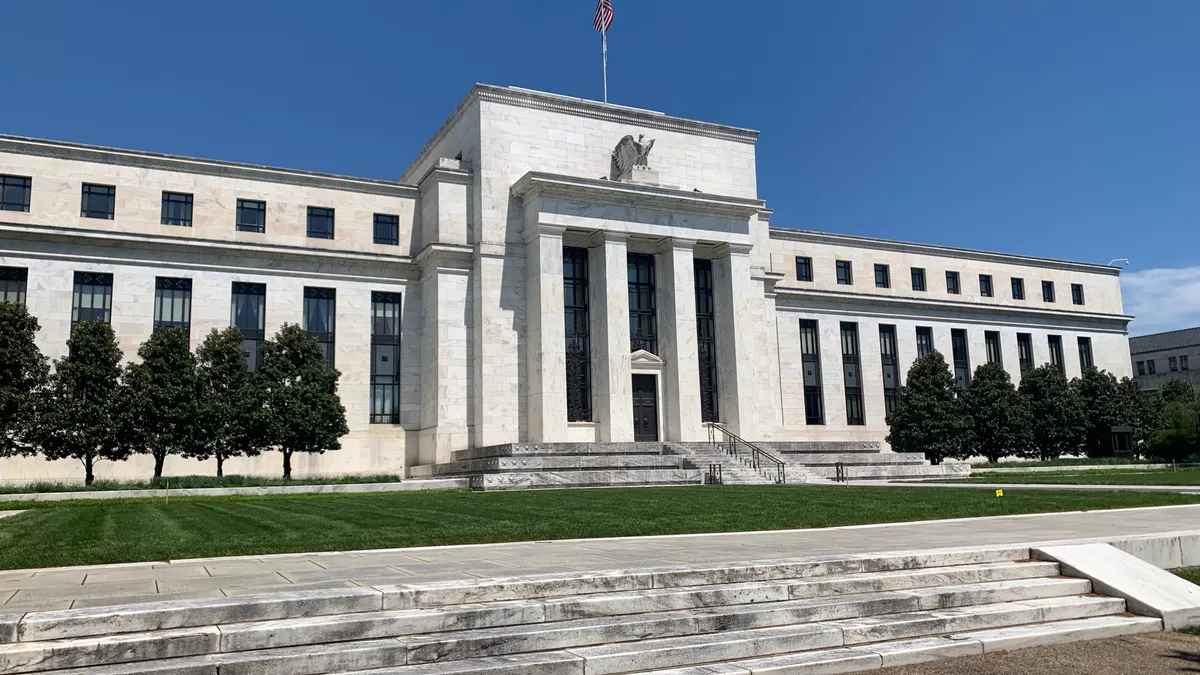Dive Brief:
- Six bank trade groups called on the Federal Reserve to provide more clarity over the way it grants master accounts to nontraditional companies, according to a letter the groups sent the central bank Friday.
- The Bank Policy Institute, the American Bankers Association, the Consumer Bankers Association, the Independent Community Bankers of America, the Mid-Size Bank Coalition of America and The Clearing House wrote in response to updated guidelines the Fed proposed last March, which would create a tier-based framework for evaluating applications.
- The new framework does not adequately address how the Fed would evaluate “novel charter” applicants — defined as entities that are neither insured depository institutions nor uninsured institutions that are part of a bank holding company, the groups said.
Dive Insight:
Republican senators raised the issue of transparency and ethics with regard to master account approval at the Fed during the nomination process for Sarah Bloom Raskin, a former candidate to serve as the central bank's vice chair for supervision.
Sen. Cynthia Lummis, R-WY, implied that Raskin used her influence as a recent Fed governor to help the fintech Reserve Trust gain a Fed master account, allowing the company to move money without working with a bank.
The Federal Reserve Bank of Kansas City denied Reserve Trust's first application for a master account in June 2017, a month after Raskin joined the fintech’s board.
Lummis said Raskin called the Kansas City Fed in August 2017 about the denied application. Reserve Trust was granted a Fed master account in 2018.
The Fed has been looking to update its guidelines surrounding master accounts for more than a year. Last month, it pushed a tiered approach with regard to financial institutions’ requests for access to Fed accounts and payment services.
Under the proposal, institutions with federal deposit insurance would receive a "more streamlined level of review, those without insurance that are supervised by a federal banking agency would undergo an intermediate level of review, and those without insurance and not supervised by a federal bank regulatory agency would be subject to a stricter level."
The authors of Friday's 10-page letter want the Fed to explain how applications will be reviewed and scrutinized. They also seek further clarity as to which institutions are legally eligible to apply for reserve bank accounts and services.
“We continue to have significant concerns that the reproposal does not appropriately and transparently address how the Board and Reserve Banks will resolve many of the most fundamental issues that any application by a novel charter is likely to raise,” the groups wrote.
The groups want the Fed to explain how the country’s reserve banks will monitor institutions at each tier on an ongoing basis and called for the central bank to clarify that any decision to grant accounts or services to a Tier 2 or Tier 3 applicant should be subject to review and approval by the Federal Reserve.
“It is crucial that the Board itself play a central role in ensuring that the guidelines are applied consistently across Reserve Banks by exercising ultimate oversight of most decisions involving Tier 2 and Tier 3 applicants,” the groups wrote.
The groups said the Fed’s “central role” in granting accounts is critical.
“This type of central role for the Board is necessary in order to avoid the appearance (and reality) of an uncoordinated approach and questions around incoherent precedent,” the groups wrote.
The groups said the Federal Reserve should have the final word on whether or not an entity should be granted an account in order to eliminate the potential for “forum shopping by applicants and competition in laxity among Reserve Banks.”
The trade groups also called for the Fed’s guidelines to ensure that all institutions with access are held to the same standards of supervision and oversight, regardless of charter type or business model.
“[S]uch access can serve as the source of considerable risk to individual Reserve Banks, to the U.S. payments system and its participants, to financial stability and to the effective execution of monetary policy,” the groups wrote. “Given these high and unique stakes, it is critical that the standards governing access are clear, transparent and rigorous.”
The Financial Technology Association (FTA), in a letter Friday, endorsed the Fed’s effort to clarify its approach to reviewing applications, but urged the regulator to avoid an overly rigid standard that could discourage new entrants.
The group, which represents fintechs Stripe, MoneyLion and Afterpay, among others, said the Fed should expand access to its services for technology-based payments companies, arguing greater access would increase innovation and competition.
"Federal Reserve rules essentially force innovative payments companies to become lenders to access Fed services, passing on the cost to consumers,” the association wrote.
In a statement, FTA CEO Penny Lee called for the modernization of Fed account access standards to reflect innovation and consumer demand.
“We urge the Federal Reserve to level the playing field so that consumers can benefit from lower costs and faster, responsible services,” Lee said.












